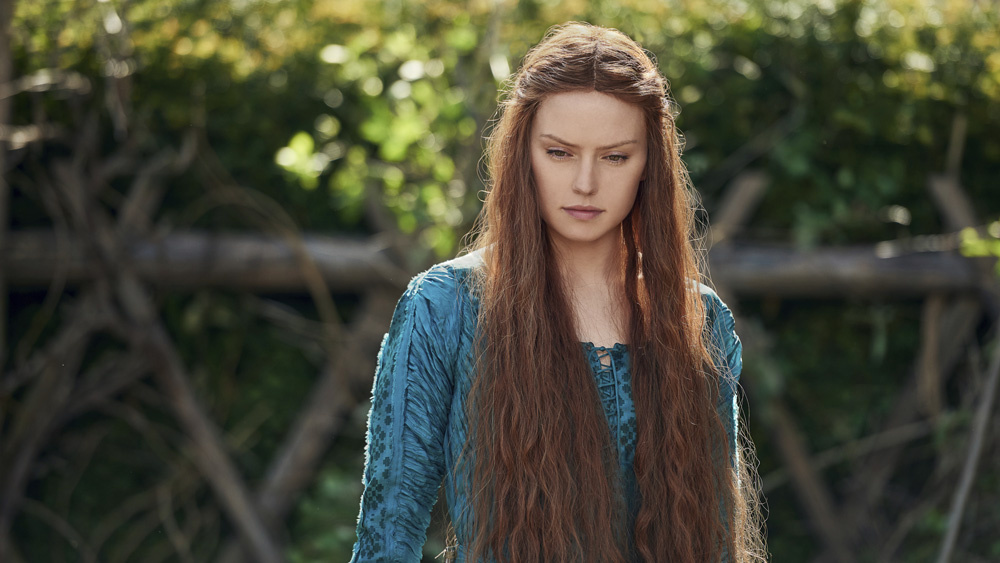The power of enduring stories is that they can be reshaped, remoulded, transmogrified, and morphed throughout time to become echoes of what they once were. Shakespeare’s Hamlet is one such story, having had countless retellings of this timeless tale of a doomed prince throughout the years, with everyone from Laurence Olivier, to Kenneth Branagh, to Matthew Broderick as an animated lion, bringing this exceptionally bloody tale to life. In Australian director Claire McCarthy’s spin on this story, Hamlet is played by the increasingly reliable George MacKay, but this time round, the focus is not on Hamlet, but instead – as the title suggests – his equally doomed partner, Ophelia. And so here we are, in 2019, another retelling of Hamlet, but under the title of Ophelia.
History has long doomed Ophelia to a terrible death, but under the guidance of author Lisa Klein and co-writer Semi Chellas, the two work together to adapt Klein’s book which carefully brings dignity and respect to the legacy of Ophelia. No longer is she a woman driven mad by grief, but instead an observant handmaiden who falls in love with a prince, and in turn, both are thrust into a desperate and dangerous set of events that they cannot control. While the narrative of Hamlet is one that is familiar to most, it’s impressive that Klein and Chellas manage to weave together a script that honours Shakespeare’s dialogue, while also managing to make Hamlet’s story feel new and surprising.
The titular Ophelia is played by Daisy Ridley, and immediately it’s clear that she relishes the chance to play this deep character, enjoying the chance she gets to perform with some kind of grounded normalcy, away from the realm of science-fiction and digital trickery that we’ve all come to know her for. There’s a tricky line when it comes to portraying someone who is merely observing a plot going by, and Daisy Ridley manages to hover over that line well, imbuing Ophelia with enough character and purpose to ensure that once the plot genuinely kicks into gear, she’s the driver of her own narrative.
Ridley is well supported by seasoned actors Naomi Watts and Clive Owen. Watts plays Gertrude, clearly relishing the chance to adorn herself in sumptuous period attire. The costume design by Massimo Cantini Parrini and makeup by Alessandro Bertolazzi goes into overdrive many a time, with Watts, Ridley, and Owen all looking period appropriate for such a story. Clive Owen maybe overplays his hand as the obviously villainous Claudius a little too much, but this could merely be Owen attempting to honour the hyper-dramatised stage roots of Hamlet.
While society may not have been yearning for a revisionist take on Hamlet, it is a welcome addition to the ever growing recontextualisation of women’s stories throughout history. With Margaret Atwood taking the narrative of the Odyssey, and focusing it on the perspective of Penelope in The Penelopiad, to Natalie Haynes book A Thousand Ships which explores the untold stories of women in the Trojan War, there is a desire and a need to explore these hidden stories of women throughout time. After all, history is a hyper-masculine realm, with most stories being carried on throughout time about great men who have conquered the lands of the worlds, all the while their wives or lovers remained at home, doting on whatever child they had back there.
To carry on the Australian skew, due to the Aussie roots of director Claire McCarthy, I would also like to remind of the existence of the brilliant book Devil’s Ballast, a Perth written book about Anne Bonny, a pirate whose life has long been overshadowed by other notorious pirates of her era. This uncovering of untold and hidden stories of women throughout time is reason alone why Ophelia carries great value. It delivers a welcome perspective to the tale of the long considered ‘mad wife’ of Ophelia, and it’s thanks to the wonderful performance from Daisy Ridley that this is so.
Director: Claire McCarthy
Cast: Daisy Ridley, Naomi Watts, Clive Owen
Writers: Lisa Klein, Semi Chellas, (based on the book Ophelia by Semi Chellas, and Hamlet by William Shakespeare)



